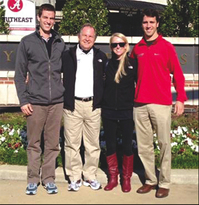“Beyond excited” is the way Erica Stanley describes her opportunity to participate in the American Physical Therapy Association (APTA) Sports Physical Therapy Section (SPTS) 2013 Traveling Fellowship.
As one of three physical therapists selected from across the nation, Stanley left Yankton October 17 and traveled with the other fellows to U.S. locations that included Cleveland, New York, Birmingham and other cities.
“During the trip, we met, followed and networked with various physicians, surgeons, athletic coaches, therapists, and individuals such as Gary Calabrese,” Stanley says. “We also connected with Tim Tyler and Kevin Wilk.”
Senior Director of Sports Health and Orthopaedic Rehabilitation at Cleveland Clinic, Gary Calabrese oversees numerous clinics throughout the Cleveland, Ohio area. Gary also supervises the physical therapy program with professional sport teams; including the Cleveland Browns, Cleveland Cavaliers, and Cleveland Indians.
In addition, residency and fellowship opportunities are affiliated with the Cleveland Clinic.
Timothy (Tim) F. Tyler MS, PT, ATC has been working in sports medicine for the last 20 years. In 1989 he graduated from Southern Connecticut State University and started working as an athletic trainer. After receiving a Masters in physical therapy from Long Island University, he started as a staff physical therapist at the Nicholas Institute of Sports Medicine and Athletic Trauma at Lenox Hill Hospital. Shortly thereafter he was promoted to Clinical Research Associate where he remains on staff as a consultant. Tim owns PRO Sports Physical Therapy and is the president of the SPTS.
Dr. Kevin Wilk has led a distinguished career as a clinical physical therapist for the past 29 years, as a leading authority in rehabilitation of sports injuries and orthopaedic lesions. He has made significant contributions to laboratory research, bio-mechanical research and clinical outcome studies. Wilk is Associate Clinical Director for Champion Sports Medicine and is the Director of Rehabilitation Research at the American Sports Medicine Institute in Birmingham, Alabama. He works with various professional athletes and teams, including the Tampa Bay Rays.
“It has been so humbling to be chosen to take part in this fellowship,” Stanley says. “In order to qualify for the fellowship, I had to complete an application that required membership in APTA and SPTS. I also had to submit my curriculum vitae, letters of recommendation and a personal statement indicating why I applied for the fellowship.”
One of Stanley’s main objectives through her experience is to continue to learn about her medical profession and what other physical therapists and physicians are doing.
“I gained insight, knowledge and additional skills to further my practice as a physical therapist and my individual skills,” Stanley says. “The opportunity to work with all these various individuals, athletes and clinics throughout the United States has been very rewarding.”
Stanley is employed full-time by Lewis & Clark Orthopedic and Sports Therapy at Yankton’s Lewis & Clark Specialty Hospital. She also works on a PRN basis for Yankton Medical Clinic, PC.
“I work in various settings,” Stanley says, “including inpatient and outpatient, seeing patients of all ages and diagnoses. I am also involved with home health care. My areas of interest include orthopedics and sports, especially athletic sports rehabilitation.
I have a high interest in the realm of sports physical therapy and the fellowship involved numerous aspects in this field.”
Stanley, who grew up in Claremont, South Dakota, and completed her Bachelor of Science and Doctor of Physical Therapy degrees at the University of South Dakota. She recognizes that the growing number of athletes at local, state and national levels requires adequate access to quality physical therapy. As a physical therapist, she is trained to identify various limitations and deficiencies of the body.
Physical therapists must be knowledgeable about surgical procedures and treatment goals, and can tailor their efforts to improve an athlete or individual’s well-being. After injury and/or surgical procedure, it is important that therapy is planned in conjunction with the diagnosis. Physical therapists are knowledgeable about the body and can help ensure a successful outcome.
“It’s extremely important for athletes to access quality care,” Stanley says. “Various research, protocols and injury management were presented during the fellowship. Having access to that information and knowledge will be very beneficial to me as I continue to work in rehabilitation of athletes of all ages.”
Serious athletic injuries typically involve both physical and mental pain. A speedy and thorough recovery is most often part of a customized treatment plan designed to address individual needs.
The treatment plan is coordinated with the physician, therapist, and athlete and focuses on an individualized program for that particular athlete. In order to ensure the best outcome for the athlete, a personalized program addressing the specific needs of the athlete is necessary.
“I was surprised to be chosen for this fellowship,” Stanley says.
“When the call came in, and an unregistered number showed up on my caller ID, I assumed it was something like my credit card calling to inform me of fraud on my account!”
“There are so many successful therapists out there, I didn’t expect that a young physical therapist from South Dakota would have this kind of opportunity,” Stanley adds. “It’s difficult to explain how much I appreciated the experience.”



